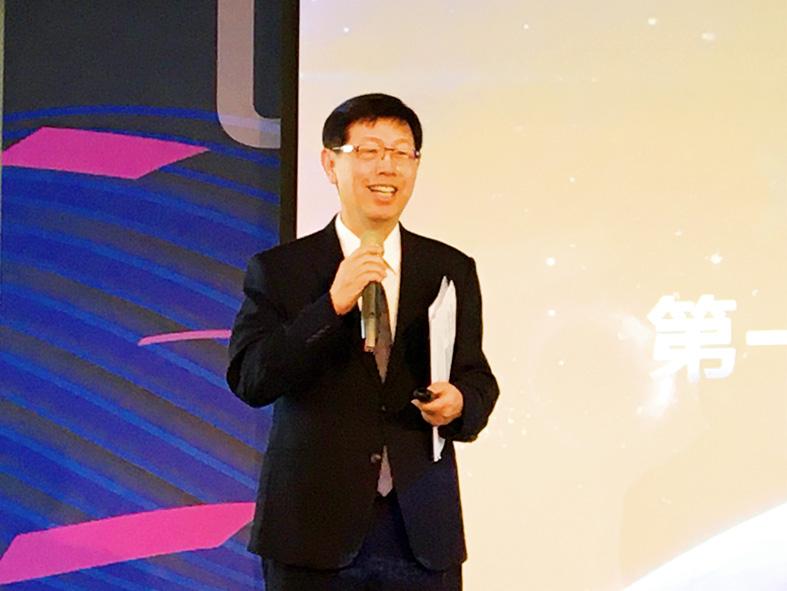Hon Hai Precision Industry Co (鴻海精密) has been shifting its focus toward developing quantum technology, which it sees as vital to creating Taiwan’s next miracle in the semiconductor industry, the company said on Saturday.
In its first quantum technology forum held in Taipei, Hon Hai chairman Young Liu (劉揚偉) said the company, also known as Foxconn Technology Group (富士康科技集團) in the global market, established a quantum computing research institute in June as part of its efforts to enter the field.
When he first heard of quantum-powered computers in 2014, Liu did not know exactly what the technology was, he said, adding that it was not until November last year that he began to learn about its use in blockchain applications and Hon Hair started putting resources toward it.

Photo: CNA
In the field of physics, a quantum is the minimum amount of any physical entity involved in an interaction.
As of September, US$21.9 billion had been invested globally in quantum technology, Liu said, adding that the Ministry of Science and Technology has pledged to invest NT$8 billion (US$282 million) in quantum technology development over the next five years.
Hon Hai’s quantum technology institute would develop advanced core technologies over the next three to seven years, Liu said.
“Driven by quantum technology development, Taiwan’s electronics sector will enter a new era,” said Liu, who had led the company’s semiconductor initiatives before he was appointed chairman last year. “With the new technology, Taiwan will create a miracle in its semiconductor industry.”
One of the initiatives of Hon Hai’s quantum computing research institute is its Q-Hub lab project, which was launched in collaboration with National Taiwan University’s physics department, Liu said, adding that Chung Yuan Christian University has also been working with Hon Hai to offer quantum technology-related courses.
The quantum technology institute is expected to collaborate with public, private and academic sectors to build Taiwan’s capability in the area and work with a pool of 60 experts in the field, he said.
On the business outlook for the global information communication technology sector next year, Liu said he was upbeat about emerging technologies such as 5G applications, servers and electric vehicles in the first half of the year.
However, the development of the global economy would depend largely on the effectiveness of COVID-19 vaccines, he said.
In the past few years, Hon Hai has been working to expand from solely hardware manufacturing into software development, to boost its profitability, Liu said.
In the initial phase of diversification, Hon Hai’s gross margin is expected to increase by 1 percentage point to 7 percent, and when the upgrade is completed, the margin will likely rise to 10 percent by 2025, he said.

KEEPING UP: The acquisition of a cleanroom in Taiwan would enable Micron to increase production in a market where demand continues to outpace supply, a Micron official said Micron Technology Inc has signed a letter of intent to buy a fabrication site in Taiwan from Powerchip Semiconductor Manufacturing Corp (力積電) for US$1.8 billion to expand its production of memory chips. Micron would take control of the P5 site in Miaoli County’s Tongluo Township (銅鑼) and plans to ramp up DRAM production in phases after the transaction closes in the second quarter, the company said in a statement on Saturday. The acquisition includes an existing 12 inch fab cleanroom of 27,871m2 and would further position Micron to address growing global demand for memory solutions, the company said. Micron expects the transaction to

Vincent Wei led fellow Singaporean farmers around an empty Malaysian plot, laying out plans for a greenhouse and rows of leafy vegetables. What he pitched was not just space for crops, but a lifeline for growers struggling to make ends meet in a city-state with high prices and little vacant land. The future agriculture hub is part of a joint special economic zone launched last year by the two neighbors, expected to cost US$123 million and produce 10,000 tonnes of fresh produce annually. It is attracting Singaporean farmers with promises of cheaper land, labor and energy just over the border.

US actor Matthew McConaughey has filed recordings of his image and voice with US patent authorities to protect them from unauthorized usage by artificial intelligence (AI) platforms, a representative said earlier this week. Several video clips and audio recordings were registered by the commercial arm of the Just Keep Livin’ Foundation, a non-profit created by the Oscar-winning actor and his wife, Camila, according to the US Patent and Trademark Office database. Many artists are increasingly concerned about the uncontrolled use of their image via generative AI since the rollout of ChatGPT and other AI-powered tools. Several US states have adopted

A proposed billionaires’ tax in California has ignited a political uproar in Silicon Valley, with tech titans threatening to leave the state while California Governor Gavin Newsom of the Democratic Party maneuvers to defeat a levy that he fears would lead to an exodus of wealth. A technology mecca, California has more billionaires than any other US state — a few hundred, by some estimates. About half its personal income tax revenue, a financial backbone in the nearly US$350 billion budget, comes from the top 1 percent of earners. A large healthcare union is attempting to place a proposal before